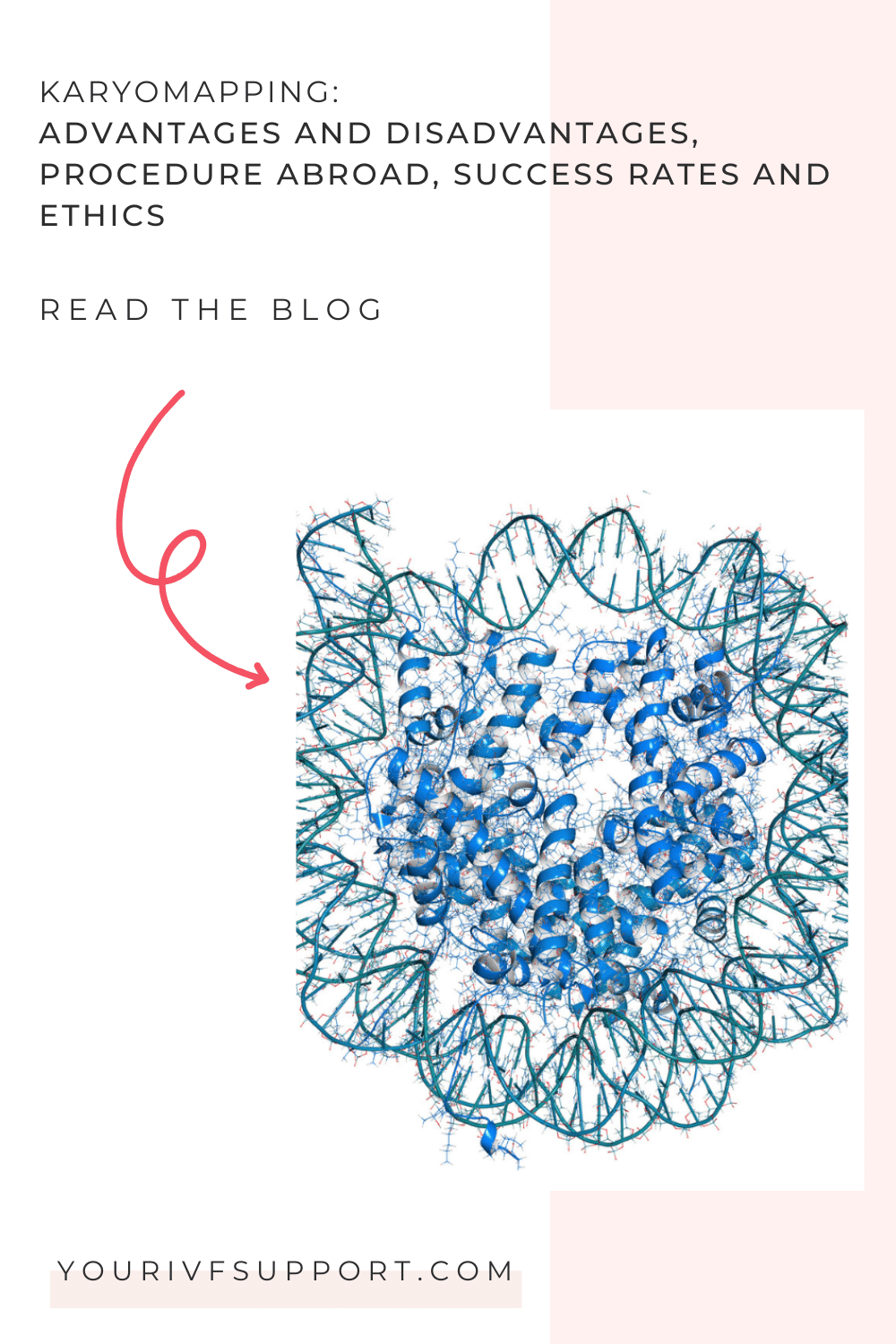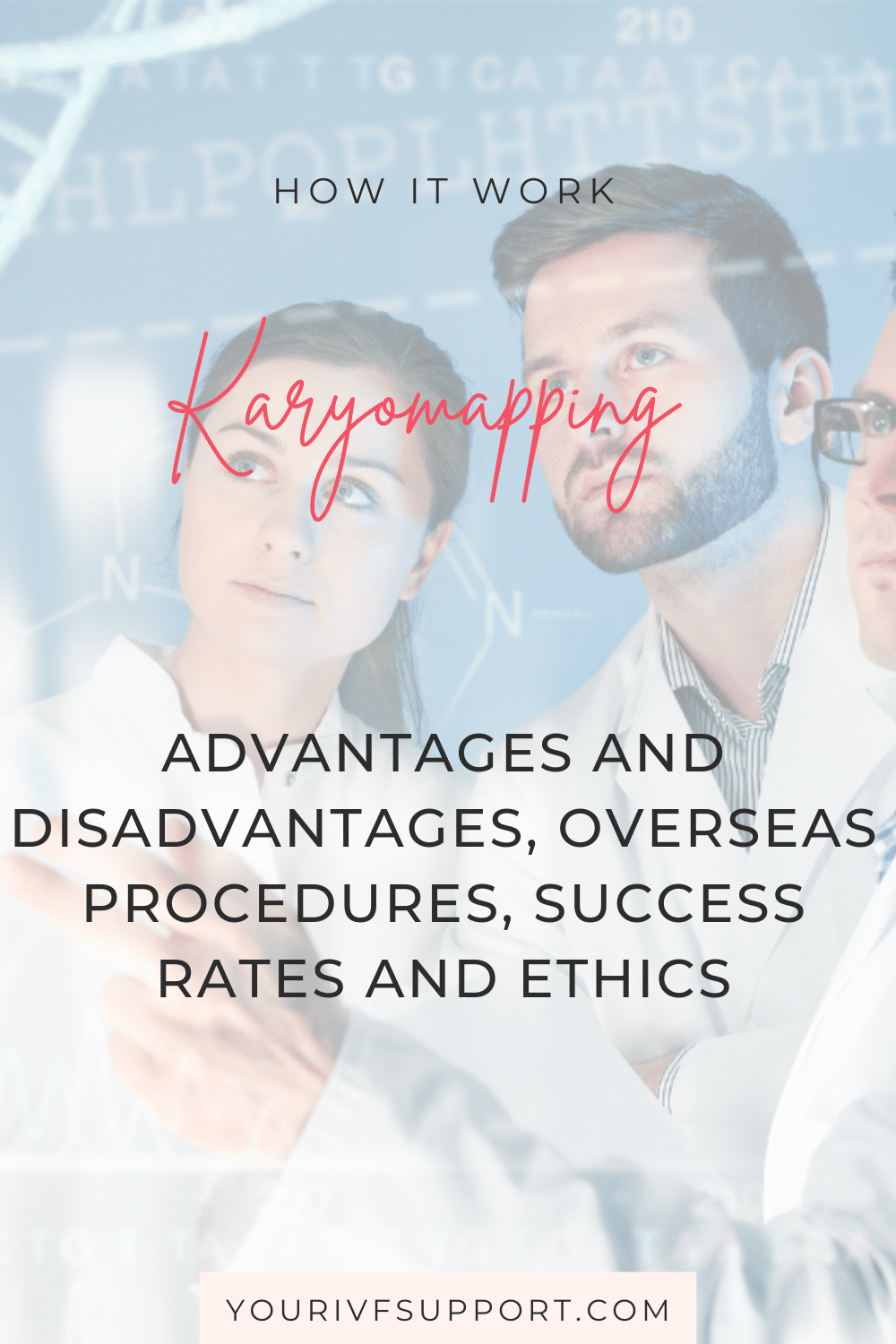The desire to have children is a big dream for many couples. Unfortunately, for some couples this wish remains unfulfilled. The causes of infertility can be many and varied and often include genetic factors. In the past, attempts were made to avoid genetic defects through artificial insemination or pre-implantation diagnostics (PID). However, healthy embryos were also unnecessarily discarded.
An innovative method for genetic screening of embryos is called karyomapping. This involves examining the genetic material of an embryo for chromosomal changes and hereditary diseases. Unlike PGD, karyomapping can also search for specific hereditary diseases and thus significantly increase the chances of a successful pregnancy.
In this article, we will take a closer look at karyomapping, highlighting its advantages and disadvantages, as well as its applications and limitations.
Karyomapping is an innovative method for the genetic examination of embryos, which is used for couples who wish to have children. By examining the embryo's genetic material, chromosomal changes and hereditary diseases can be detected. In contrast to pre-implantation diagnostics (PGD), which also sorts out healthy embryos, karyomapping can specifically search for specific hereditary diseases and thus increase the chance of a successful pregnancy.
But how does karyomapping work exactly? Basically, it is a form of genome sequencing that was developed specifically for the diagnosis of genetic diseases. In this process, the genetic material of the embryo, which comes from the egg and sperm of the parents, is examined for certain chromosomal changes and genetic mutations.
The examination is carried out by taking cells from the embryo and then analysing them. In the process, the DNA molecules of the embryo are cut into smaller fragments, which are then analysed using special sequencing technologies. In this way, a large number of genetic variants can be uncovered, which are then analysed for specific diseases.
What is special about karyomapping is that it can specifically search for specific genetic mutations. Thus, couples with a family history of a certain hereditary disease can have this mutation specifically searched for in the embryo's genetic material. In this way, embryos with this genetic mutation can be specifically excluded and only those that are free of the disease can be selected.
Karyomapping thus offers a promising possibility to increase the chances of success of artificial insemination and to avoid genetically caused diseases in the family. However, the method is also associated with costs and risks that should be carefully weighed.
Karyomapping can be a promising way to help couples who wish to have children to achieve a healthy pregnancy and avoid genetic diseases in the family.
Why is karyomapping used in connection with the desire to have children and treatment abroad?
Couples who wish to have children and have a genetic predisposition to certain diseases can often benefit from the use of karyomapping. Karyomapping allows embryos to be screened for specific genetic variants, so that only those embryos that are free from the disease in question are selected. This can increase the chances of a successful pregnancy and minimise the risk of passing on a genetic disease to the child.
Karyomapping can be a particularly promising option for treatment abroad. Many clinics abroad specialise in reproductive treatments and can offer higher success rates and lower costs than clinics in Germany. Karyomapping is often offered as an additional option to further improve the success of artificial insemination.
However, it should be noted that karyomapping is not permitted in all European countries. In some countries there are legal restrictions on the use of karyomapping, as it is considered to interfere with the genetic material of the embryo. Therefore, it may be useful to find out about the legal framework in your country and consider alternatives if necessary.
Karyomapping offers couples wishing to have children a promising way of avoiding genetic diseases and increasing the chances of a successful pregnancy. However, when choosing a clinic abroad, couples should carefully consider not only the costs and success rates, but also the legal framework and risks.
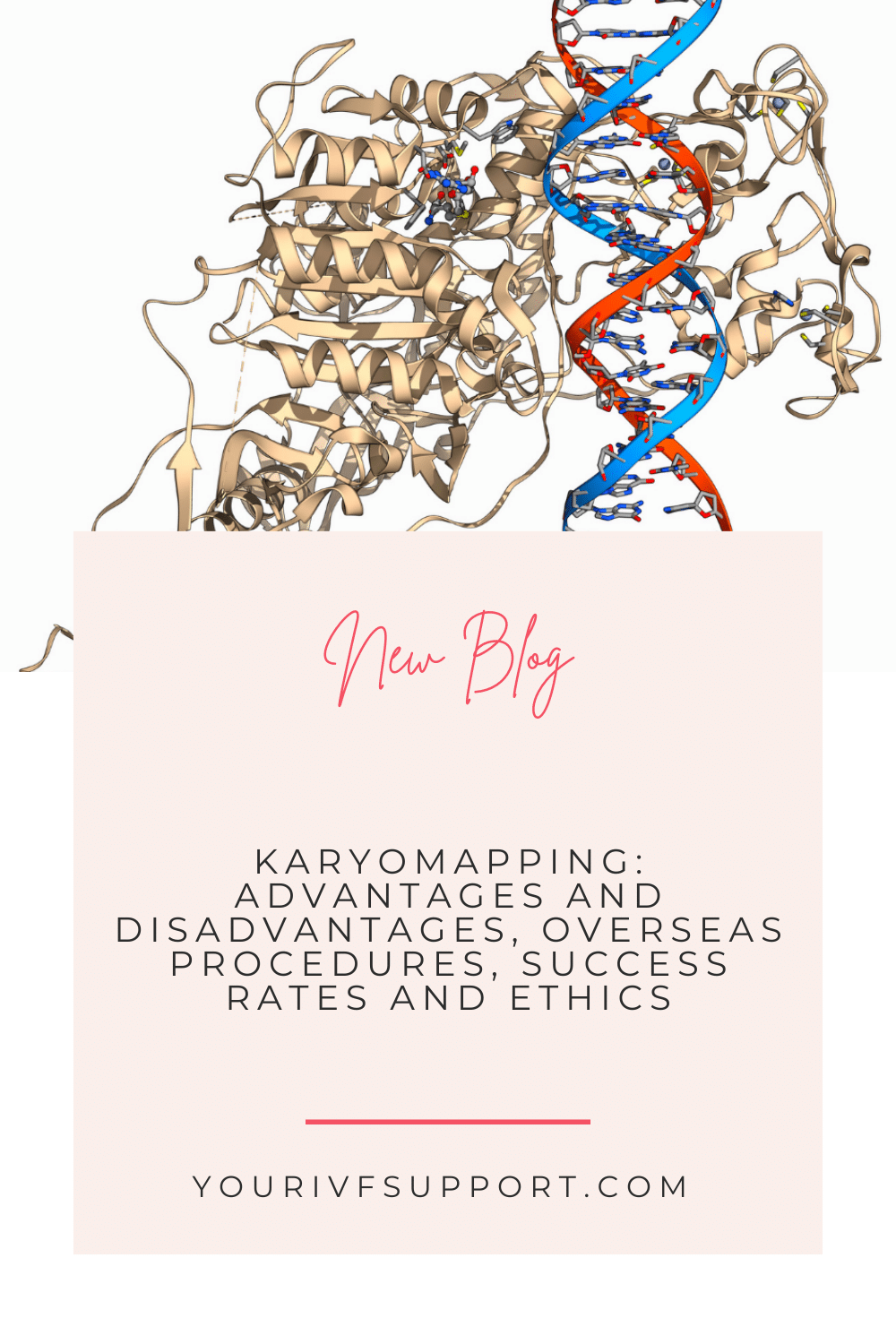
Karyoma mapping, PGD and NGS: What are the differences and which is the best choice for assisted reproduction?
Karyomapping, PGD and NGS (next-generation sequencing) are all methods of genetic testing of embryos used in assisted reproduction. However, the difference between these methods lies in the way in which the genetic material of the embryos is examined.
PGD is a method in which the genetic material of the embryos is examined for chromosomal changes. Cells from the embryo are taken and examined for abnormalities in the number of chromosomes. As a chromosomal abnormality is often associated with a lower chance of a successful pregnancy, embryos with a normal number of chromosomes can be selected for implantation.
NGS is a technique that tests the embryo's genetic material for genetic mutations. The genetic material is cut into smaller fragments and then sequenced. This can reveal certain genetic variants that may be responsible for certain diseases.
Karyomapping is a special form of NGS that looks for specific genetic variants. It uses specific genetic markers to look for specific genetic variants that are responsible for a particular disease. In this way, embryos that are free of the disease in question can be selected.
In contrast to PGD and NGS, karyomapping is able to specifically search for certain genetic variants and thus select embryos that are free of certain diseases. PGD, on the other hand, can select embryos with a normal number of chromosomes, but cannot look for specific genetic variants.
All three methods are promising ways of helping couples trying to have children to achieve a healthy pregnancy. However, the choice of method depends on the individual situation and should be discussed with a doctor.
What are the advantages and disadvantages of karyomapping compared to conventional genetic testing?
Karyomapping is a relatively new method for the genetic diagnosis of embryos used in assisted reproduction. Karyomapping has both advantages and disadvantages compared to conventional methods such as preimplantation genetic diagnosis (PGD).
One of the advantages of karyomapping is that it can target specific genetic variants responsible for a particular disease. This makes it possible to select embryos that are free of the disease in question. In contrast, PGD can screen out embryos that have a chromosomal abnormality, but does not specifically look for a particular genetic variant.
Another advantage of karyomapping is that it can be used for a wide range of genetic diseases. It is not limited to specific chromosomal aberrations, as is the case with PGD. Karyomapping is also a promising option for couples with recurrent miscarriages.
However, karyomapping also has some disadvantages. Firstly, it is a relatively expensive procedure and not all clinics offer it. Secondly, it is not allowed in all countries because it is considered an intervention in the embryo's genetic material.
There is also a risk that the removal of cells from the embryo could damage the embryo and affect its development. In addition, karyomapping can give false-positive or false-negative results, which can lead to the wrong embryo being selected.
Nevertheless, karyomapping offers promising possibilities for increasing the success of artificial insemination and avoiding genetic diseases. However, when deciding for or against karyomapping, couples should carefully weigh up the advantages and disadvantages and seek the advice of an experienced doctor.
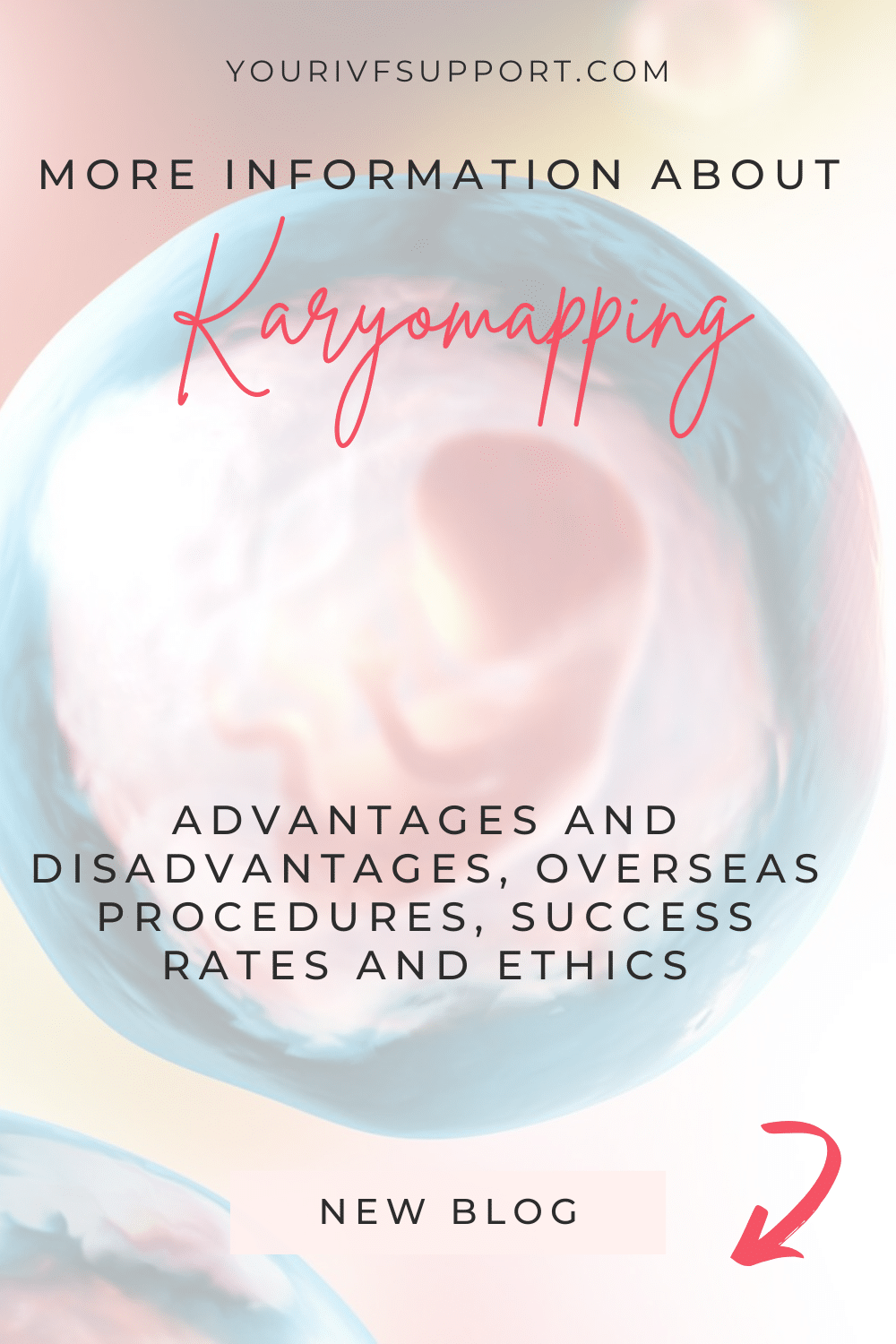
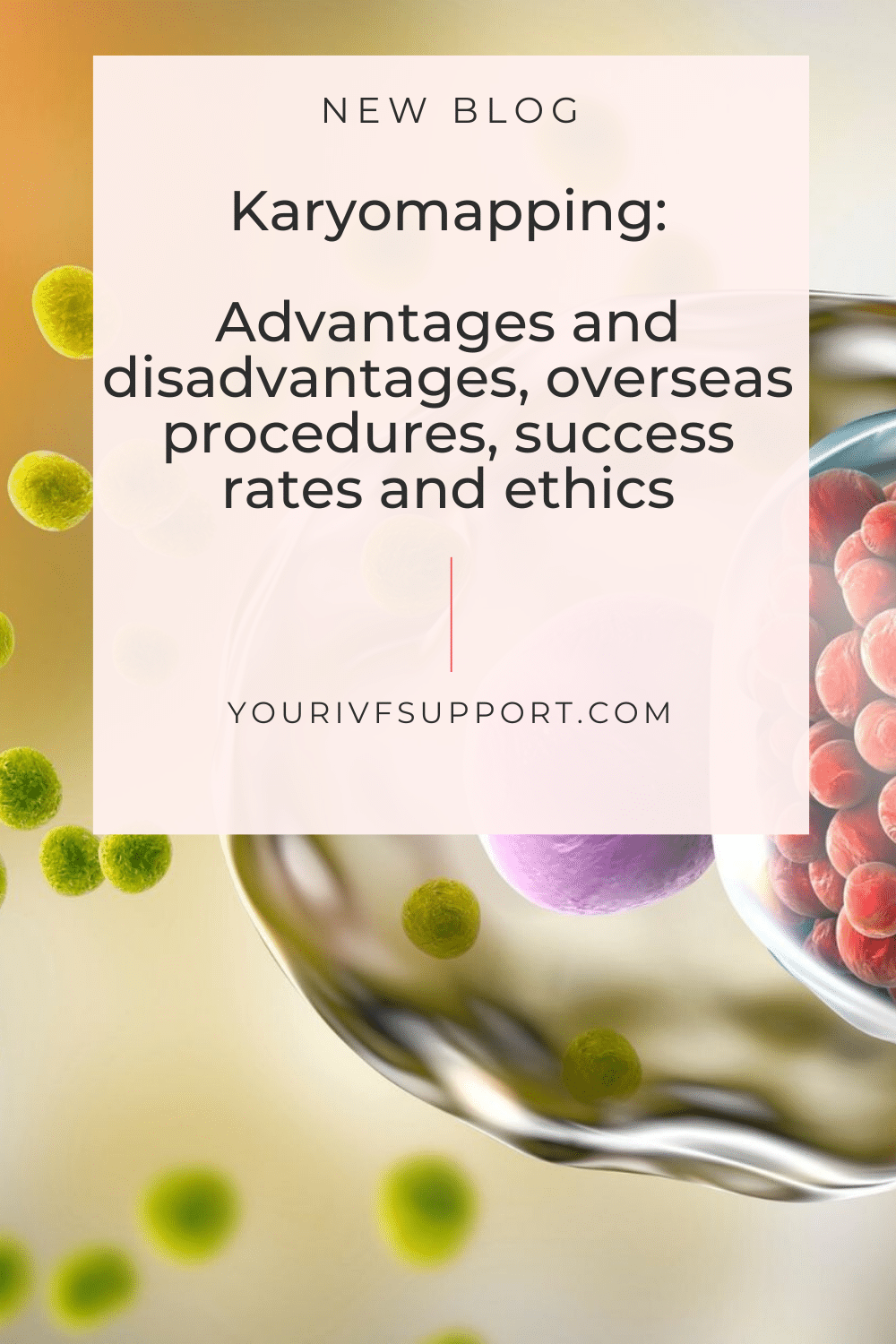
How does a karyomapping procedure work and what are the costs?
Karyomapping is a relatively new technique for the genetic diagnosis of embryos used in assisted reproduction. The procedure can be described as follows:
In vitro fertilisation (IVF)
The first step is IVF, where the woman's eggs and the man's sperm are fertilised outside the body. This creates embryos that are grown in the laboratory.
Cell collection
After a few days, cells are taken from the embryo to study the genetic material for specific genetic variants. The cells can be obtained either through a biopsy or by removing individual cells from the embryo.
Karyomapping
The cells are tested for specific genetic variants associated with the disease in question. This allows embryos to be selected that are free of the disease in question.
Implantation
The selected embryos are transferred to the woman's uterus to enable pregnancy.
In terms of cost, karyomapping is usually more expensive than conventional genetic diagnosis methods such as pre-implantation genetic diagnosis (PGD). Costs can vary between clinics and countries, but are often in the region of several thousand euros per cycle.
However, it is important to note that the cost of karyomapping may depend not only on the clinic but also on the number of cycles required to achieve pregnancy. Additional tests, such as testing for chromosomal abnormalities, can also add to the cost.
Overall, karyomapping offers couples with a genetic predisposition to certain diseases a promising way of increasing the success of artificial insemination and avoiding genetic diseases. However, the costs should be carefully considered and discussed in advance with the fertility clinic.
Karyoma mapping and treatment abroad
Karyoma mapping can be a promising method for infertility treatment, to avoid genetic diseases and to increase the success of fertility treatment. However, it is not permitted everywhere and the cost can vary from country to country and clinic to clinic. Many couples therefore opt for treatment abroad, where specialist clinics and experienced doctors specialise in karyomapping and have a high success rate. Countries such as Spain, Greece, the Czech Republic and Northern Cyprus are leaders in the use of karyomapping. However, it is important to do your research as not all countries allow karyomapping and there may be language and legal barriers. Treatment abroad can also mean cost savings, but it is important to consider the total cost of treatment, including travel, accommodation and additional tests. Careful consideration of the pros and cons is essential to make the best decision for your situation.
"Karyomapping abroad can be a cost-effective option to prevent genetic diseases and increase the success of fertility treatment. However, it is important to carefully consider all factors, including overall costs and potential risks, before making a decision."
What are the advantages and disadvantages of karyomapping abroad?
Advantages
Access to specialist clinics and experienced doctors Karyomapping requires specialist knowledge and skills. In some countries there are specialist clinics and doctors who specialise in karyomapping and have a higher success rate. Treatment abroad may allow couples to access this expertise and improve their chances of success.
Cost-effectiveness: The cost of karyomapping may be lower in some countries than in others. Treatment abroad may therefore be a cost-effective alternative, especially if additional tests such as chromosome aberration testing need to be carried out. In some cases, the total cost of treatment abroad may also be lower than at home.
Anonymity: In some countries it is possible to donate eggs or sperm anonymously. For couples who want to protect their privacy, treatment abroad may be an attractive option.
Disadvantages
Language barriers: Treatment abroad can involve language barriers, especially if you do not speak the language of the host country. It can be difficult to understand medical terms or legal regulations.
Legal framework: The legal framework can vary greatly from country to country. It can therefore be difficult to find out about the applicable laws and regulations in the host country.
Travel expenses: Treatment abroad requires additional travel and may involve additional costs for flights, accommodation and transport. In addition, it can be difficult to coordinate travel plans, especially if multiple treatments are required.
Overall, infertility treatment with karyomapping abroad offers both advantages and disadvantages. It is important to carefully consider which option is best for one's situation and to fully inform oneself in advance about the legal framework, the costs and the chances of success.
Which countries are leading in the use of karyomapping and which clinics offer this treatment?
Karyomapping is a relatively new method of genetic diagnosis of embryos, which aims to prevent genetic diseases and increase the success of artificial insemination. Although karyomapping is not yet widespread in all countries, there is a growing number of clinics and countries that specialise in this method.
Some of the leading countries in the use of karyomapping are
Spain: Spain is known for its advanced reproductive medicine and has a large number of clinics offering karyomapping.
Czech Republic: The Czech Republic is an emerging location for fertility treatment and has a growing number of clinics offering karyomapping.
Northern Cyprus: Northern Cyprus is also an important location for karyomapping, offering advanced medical facilities and skilled professionals. If you would like to get more information about IVF treatments in Nothern Cyprus, click here.
Greece: Greece has become an important location for fertility treatment and has a number of clinics offering karyomapping.
It is important to note that karyomapping is not permitted in all countries and the availability and quality of treatment may vary depending on the country and clinic. It is therefore important to do your research and choose a qualified clinic that specialises in karyomapping and has a high success rate.
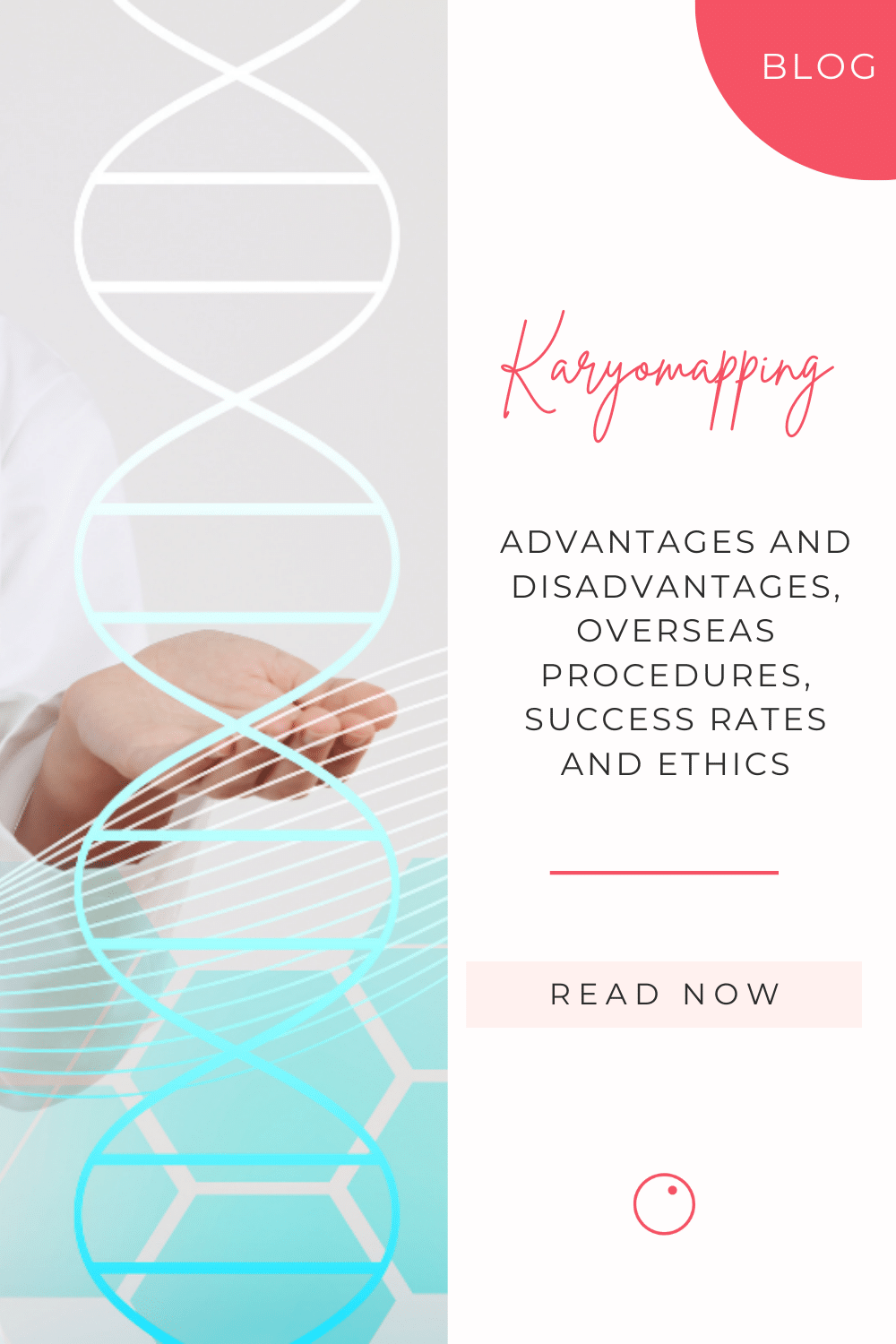
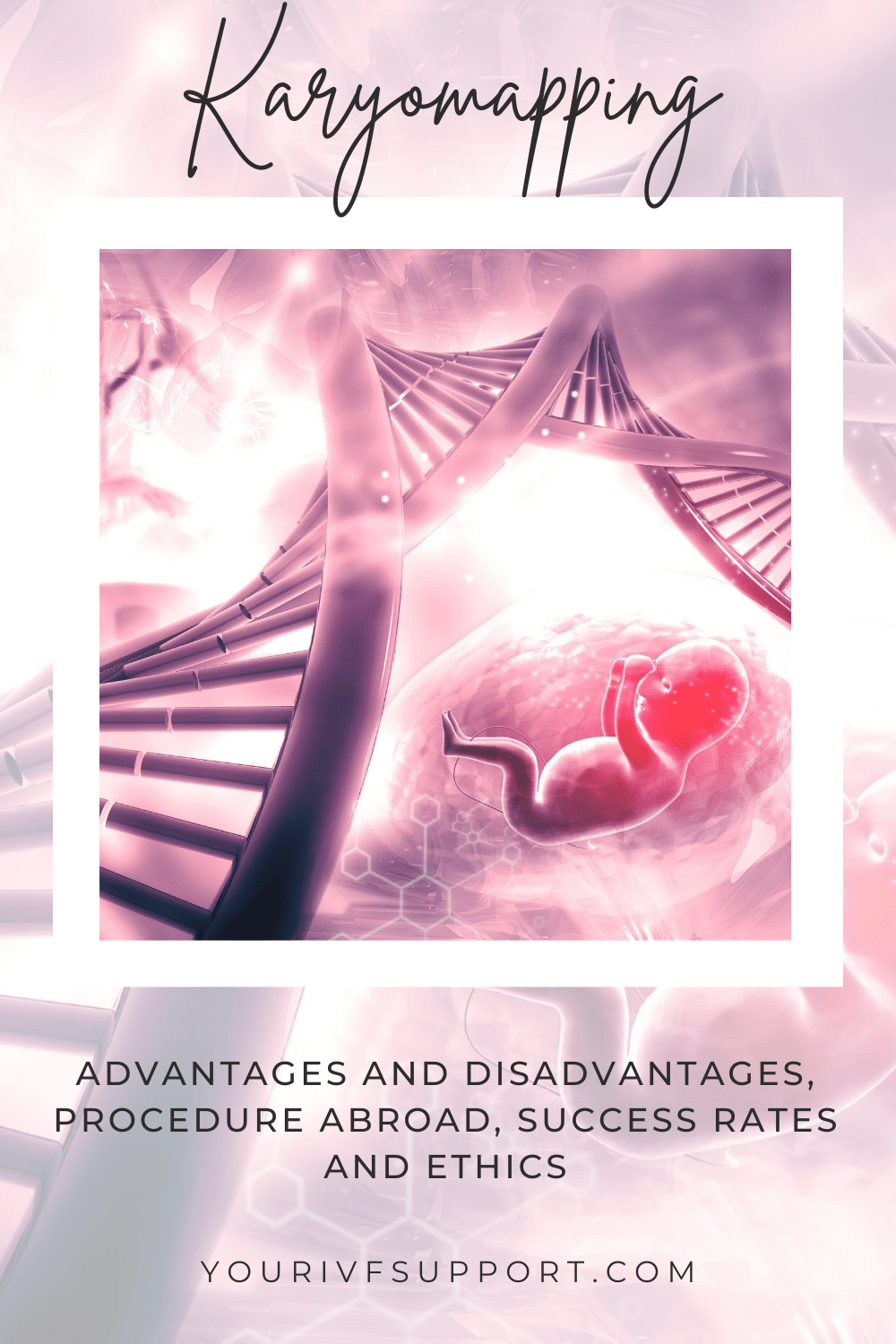
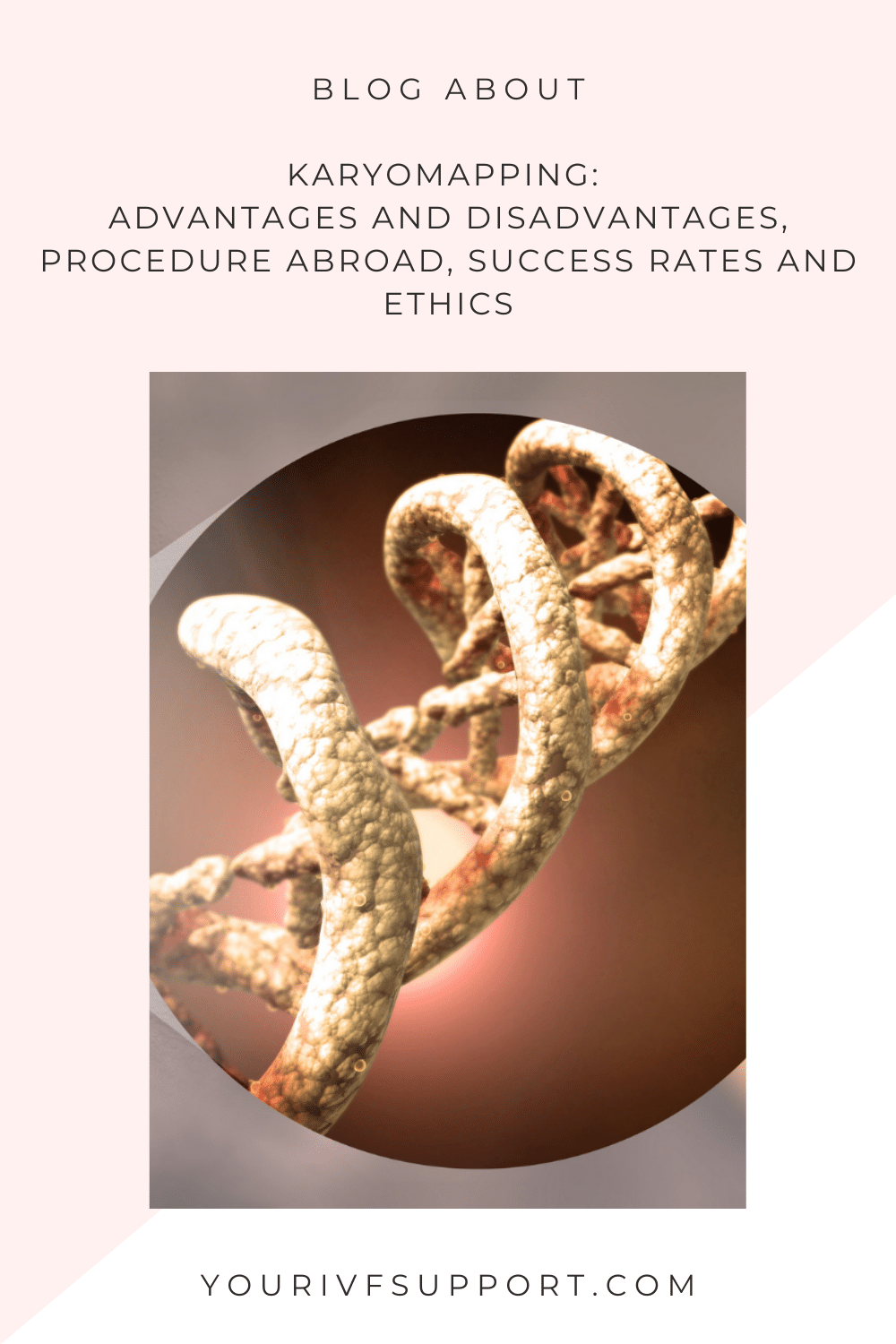
What about cost savings if you decide to go abroad for treatment?
Karyomapping can be very expensive in some countries, so it may be worth considering treatment abroad. If you choose to have karyomapping treatment abroad, you may be able to save a considerable amount of money, as the cost of treatment can vary from country to country.
In countries such as Spain, the Czech Republic, Northern Cyprus and Greece, which are among the leading countries in the use of karyomapping, the cost of treatment can be up to 50% lower than in other countries. However, the total cost depends on many factors, including the cost of travel, accommodation and additional tests.
It is important to consider the total cost of treatment when deciding whether to go abroad. Additional costs such as flights, accommodation, transport and extra tests can significantly increase the total cost of treatment and it is important to consider all costs in advance. Some clinics also offer packages that may include accommodation, transport and medical services.
It is also important to be aware that saving money on fertility treatment abroad can come with some risks. Language barriers, legal requirements and the quality of medical care can vary from country to country and clinic to clinic. It is therefore important to do your research and choose a qualified clinic that specialises in karyomapping and has a high success rate.
Undergoing karyomapping abroad can be a cost-effective option to prevent genetic diseases and increase the success of fertility treatment. However, it is important to carefully consider all factors, including the total cost and possible risks, before making a decision.
Common questions and answers
In the context of infertility and genetic diseases, karyomapping is becoming increasingly important. There are many questions around this topic that couples are looking for answers to. Here are some of the most frequently asked questions and answers about karyomapping.
Can karyomapping be used for all types of genetic diseases?
Karyomapping is an advanced genetic diagnostic method used to identify genetic mutations responsible for inherited diseases. The method has proved effective in diagnosing genetic diseases and selecting healthy embryos for artificial insemination.
However, karyomapping cannot be used for all types of genetic disease. It can only identify specific mutations in the genome and is therefore not suitable for diagnosing diseases caused by chromosomal abnormalities.
However, karyomapping can be used for a wide range of genetic conditions, including autosomal dominant, autosomal recessive and X-linked conditions. It is particularly useful for couples wishing to have children where at least one partner has a genetic condition, as it allows them to select healthy embryos for insemination, minimising the risk of inheriting the condition.
However, it is important to note that karyomapping may not be as effective in diagnosing conditions caused by multiple genes or environmental factors. In these cases, further tests may be needed to make an accurate diagnosis.
Overall, karyomapping can be used for a wide range of genetic conditions, but it is important to consult with a qualified doctor or geneticist to determine if karyomapping is appropriate for your specific condition.
What is the success rate of karyoma mapping in fertility treatment?
Karyomapping is an innovative technology that offers couples wishing to have children a promising way of selecting healthy embryos for insemination, thereby minimising the risk of genetic disease in their offspring. However, the success rate of karyomapping depends on many factors, including the age of the woman, the health of the partners and the specific genetic disease.
There are several studies that have looked at the success rate of karyomapping in fertility treatment. A meta-analysis of 11 studies published in 2018 found an average implantation rate of 55.5% and a pregnancy rate of 60.2% per cycle. Another study published in 2020 reported an implantation rate of 55.9% and a clinical pregnancy rate of 61.4% when karyomapping was used in couples predisposed to hereditary cancer.
However, it is important to note that the success rate of karyomapping varies for each treatment and depends on many factors. These factors include the age of the woman, the quality of the embryos, the specific genetic condition and the experience of the doctor or fertility clinic in performing karyomapping.
Karyomapping is a promising method of selecting healthy embryos for artificial insemination and can help couples with infertility to increase their chances of a successful pregnancy. However, it is important to do your research and seek advice from a qualified doctor or clinic to determine whether karyomapping is suitable for your particular situation.
What are the risks of karyomapping?
Karyomapping is a relatively safe method of genetic diagnosis with no immediate risks. It is based on the analysis of tiny DNA samples taken from the parents' eggs or sperm. However, there are some potential risks and disadvantages associated with karyomapping.
One of the main risks of karyomapping is that there is no 100% guarantee that all genetic mutations will be detected. Although karyomapping is very accurate and reliable, it may not detect certain mutations or chromosomal abnormalities. In rare cases, it can also give false positive or false negative results.
Another risk of karyomapping is that it may result in a low number of embryos suitable for implantation in the uterus. Although karyomapping allows couples to select healthy embryos, it can also result in fewer embryos being available, which may affect the chances of a successful pregnancy.
Finally, karyomapping can also cause emotional distress, especially if there are unexpected results or if couples experience a delay in treatment due to errors or difficulties during the procedure.
Overall, karyomapping is a relatively safe method of genetic diagnosis, but it does have some potential risks and disadvantages. It is important to seek advice from a qualified doctor or geneticist to understand the specific risks and benefits for your situation and to make an informed decision.
The cost of karyomapping in Europe can vary by country and clinic and is often high. Although karyomapping is a promising method of genetic diagnosis, it is not covered by all health insurance schemes. In some countries, such as the UK, Belgium and France, karyomapping is integrated into the national health system and covered by health insurance.
However, in other countries, such as Germany, karyomapping is not a standard reimbursable service and may result in additional costs for couples. In some cases, however, private health insurance or other sources of funding may cover the cost of karyomapping.
It is important for couples to find out in advance about their health insurance coverage and to consider other funding options if necessary. For example, in some countries, government grants or scholarships may be available for couples who wish to have children and undergo karyomapping.
It is important to do your research and seek advice from a qualified clinic or doctor to understand the specific costs and reimbursement options for karyomapping in Europe.
What is the difference between karyomapping and karyotyping?
Karyomapping and karyotyping are two different methods used in genetics to study chromosomes. Here are the main differences:
Basic principle:
- Karyomapping: Karyomapping is an advanced genetic technique that scans the entire genome for genetic abnormalities by analysing DNA sequences in many regions of the genome. It can identify specific genetic changes associated with certain diseases or conditions.
- Karyotyping: Karyotyping is a classic technique that looks at the number, shape and size of the chromosomes in a cell. It provides information on structural chromosomal abnormalities and gross numerical abnormalities.
Applications:
- Karyomapping: Karyomapping is commonly used in preimplantation genetic diagnosis (PGD) to identify genetic mutations or chromosomal abnormalities in embryos before they are transferred to the uterus. This can help prevent genetic diseases in children.
- Karyotyping: Karyotyping is often used to diagnose genetic disorders such as Down's syndrome, Turner's syndrome and other chromosomal abnormalities in people who have already been born.
Resolution and detail:
- Karyomapping: Karyomapping provides higher resolution and allows the identification of genetic mutations at the level of individual genes or small segments of DNA.
- Karyotyping: Karyotyping provides a broad overview of the chromosomal pattern of a cell, but may miss small genetic changes.
Time and effort:
- Karyomapping: Karyomapping typically requires more time and resources to perform and analyse genetic data.
- Karyotyping: Karyotyping can usually be performed more quickly and requires less complex analysis.
Overall, karyomapping and karyotyping are two different techniques for examining genetic information at different levels and are used for different purposes in genetics.
Karyomapping and ethical concerns
Although karyomapping is a promising method of genetic diagnosis, there are some ethical concerns that may arise in relation to the use of karyomapping in fertility treatment.
One of the main concerns is that karyomapping could be used to selectively abort embryos with certain genetic characteristics. This could lead to some couples favouring or discriminating against certain embryos and could also lead to a eugenic practice that could affect the diversity of the human population.
Another ethical issue is that karyomapping may help to eliminate certain inherited diseases and genetic defects, which may be unethical for some people. Some argue that this could lead to a loss of genetic diversity and that it is better for humanity as a whole that all people are born with their different genetic characteristics.
It is important to note that as well as raising ethical concerns, karyomapping can also contribute to social inequalities. Couples with higher incomes or better access to health care may have a greater chance of undergoing karyomapping, while couples with lower incomes or poorer access to health care may not have the same opportunities.
It is important that karyomapping is used ethically and responsibly to minimise potential concerns. It is important that couples seek thorough information and advice from qualified doctors and geneticists to make the best decisions for their situation. It is also important that governments and health authorities ensure that karyomapping is carried out in accordance with the ethical and moral principles that govern equitable and accessible health care for all.
Recommendations and outlook for couples with unfulfilled fertility wishes
For couples who have not been able to have children, karyomapping can be a promising way of avoiding genetic diseases and increasing the chances of success with artificial insemination. However, there are also concerns about the cost, ethics and availability of karyomapping in different countries.
When couples are considering whether karyomapping is right for them, it is important that they seek thorough information and advice from qualified doctors and geneticists. They should also consider the availability of karyomapping in their country and the cost of treatment.
If they are considering karyomapping abroad, couples should make sure they are aware of the legal framework in their country and consider possible language barriers. They should also consider the total cost of treatment, including travel, accommodation and additional tests.
It is also important to consider the ethical issues surrounding karyomapping and to ensure that the treatment is used ethically and responsibly.
Karyomapping offers a promising way to help couples with unmet fertility needs. Couples should seek thorough information and qualified advice to make the best decision for their situation.

